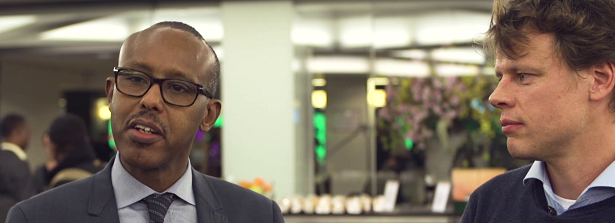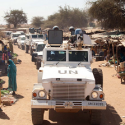Making conflict sensitivity work for food security

What can food and nutrition security (FNS) interventions contribute to transforming conflict and promoting stability? Half of the world’s hungry live in contexts of fragility, where violent conflict has destroyed livelihoods, farms, and capital, driving up the price of food. Meanwhile, high food insecurity in these contexts greatly increases the chance of violence returning. Thus, food security programming has a unique role to play in the prevention of conflict. The afternoon session on “Food security, conflict and resilience” sought to draw on lessons from FNS interventions to highlight their interaction with the key drivers of conflict and stability. The session also reflected on how food security interventions may induce (latent) conflict in settings that are not considered conflict areas.
The session brought together research projects that take place in fragile and conflict-affected countries. The complete concept note that informed this session can be found here.
The research presentations focused on Uganda, Sierra Leone, Ghana, Burkina Faso and Kenya and all had varying stories to tell about how they relate to drivers of conflict and stability. One such project was the Global Challenges Programme (GCP) research project “Helping Poor Farmers Grow Money in Sierre Leone“, which focuses on upgrading sustainable cocoa production by smallholders. Maarten Voors of Wageningen University recounted the ripple effects caused by large-scale land acquisitions in this context. While positive effects were seen for labourers and land owners, communities often lost out in terms of land and income. Christopher Kyeswa of the Applied Research Fund (ARF) research project “Cassava Applied Research for Food Security in Northern Uganda” explained how a knowledge co-creation approach provided pathways out of conflict-for different groups in a post-conflict setting dealing with severe food insecurities. As part of an NWO-funded project, Sebastiaan Soeters of Utrecht University found that the acquisition of land in Northern Ghana by agri-businesses led to the enlargement of farms and herds, resulting in increased farmer-herder conflict.
Hashi Abdullahi, who works on food security in fragile contexts at the Ministry of Foreign Affairs, gave a short response to the call for conflict sensitivity raised by the presentations. He emphasized that conflict dynamics should be considered when making policy and was keen to hear from those working on the ground. He explicitly challenged participants of the session to think in terms of practical solutions. Half the session’s participants were researchers, the other half practitioners; a quarter had experience working in fragile contexts. Participants were, thus, able to contribute to a constructive discussion and were quick to relate their experiences and the various constraints they face in achieving conflict sensitivity.
Ianthe Nieuwenhuis of RVO, for instance, pointed out that when RVO subsidizes projects it always ask for an analysis of the context and how risks can be mitigated. Yet researchers and practitioners at the table said that such mitigation usually only covers risks to the business or intervention itself, not to the communities in which these interventions are implemented. While Gerrit-Jan van Uffelen of the Centre for Development Innovation (CDI) agreed that although projects need to report in a quantitative manner about how much was ‘produced’ or how many people were included from which groups, they usually do not have to report on how drivers of conflict are affected. Some ways for how to improve policy thus became clear. But what about research and practice?
The discussion table facilitated by Maarten Voors came to the conclusion that we might not be doing enough research in the areas that actually matter. It was suggested to create a map of where research into FNS-related themes has been conducted and combine it with a map of fragile situations facing high food insecurity to determine the overlap. Of course the risks involved in working within violent conflict and military zones are significant. To overcome this, it was suggested to work more through the diaspora that is already present in the Netherlands. Meanwhile Leen Stok of Dorcas Aid International lamented that he was not aware of any simple tools that could help him integrate conflict sensitivity into his work. Another participant noted that we should also accept that conflict is part of social life and not expect to fully manage or control?
In the end, all participants agreed that focusing on the relationship between FNS programming and the drivers of conflict is important. In a final reflection on the afternoon session Hashi Abdullahi reiterated that, as a policymaker, he needs insight into what works and what doesn’t – particularly on how to promote the resilience of those living in fragile contexts. This is why the group decided to remain involved in any follow-up activities resulting from the session, including by formulating an advisory note to policymakers on conflict sensitivity.
Background information
Watch the interview with Abdullahi Hashi and Maarten Voors (Video by The Broker)






